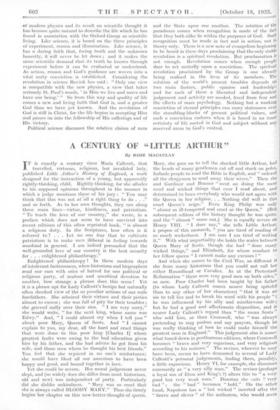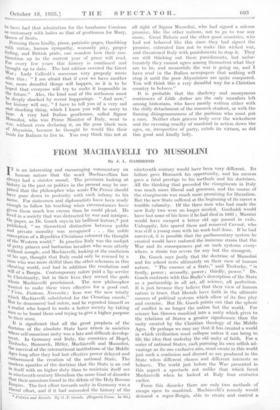A CENTURY OF 46 LITTLE ARTHUR "
By ROSE MACAULAY
IT is exactly a century since Maria Callcott, that travelled, virtuous, religious, but invalided lady, published Little Arthur's History of England, a work designed for the instruction of a young, but apparently rightly-thinking, child. Rightly-thinking, for she alludes to his supposed opinions throughout in the manner in which a judge mentions those of his jury : " You may think that this was not at all a right thing to do . . ." and so forth. As to her own thoughts, they ran along three main lines—virtue, kindliness, and patriotism. " To teach the love of our country," she wrote, in a preface which does not seem to have survived into recent editions of this often reprinted book, " is almost a religious duty. In the Scriptures, how often is it referred to ? . . . Let no one fear that to cultivate patriotism is to make men illiberal in feeling towards mankind in general. I am indeed persuaded that the well-grounded love of our country is the best security for . . . enlightened philanthropy."
Enlightened philanthropy I In these modern days of intolerant factiousness, when historians and biographers rend our cars with cries of hatred for one political or religious party, of zealous and uncritical devotion to another, how strange a phrase does this seem ! Yet it is a phrase apt for Lady Callcott's benign but naturally often shocked view of the so peculiar actions of our rude forefathers. She admired their virtues and their pieties almost to excess ; she was full of pity for their troubles ; she grieved sadly over their sins. " I am very sorry," she would write, " for the next king, whose name was Edwy." And, " I could almost cry when I tell you " about poor Mary, Queen of Scots. And " I cannot explain to you, my dear, all the hard and cruel things that were done to this poor king [Charles I] whose greatest faults were owing to the bad education given him by his father, and the bad advice he got from his wife, and those men whom he thought his best friends." You feel that she rejoiced in no one's misfortunes; she would have liked all our ancestors to have been happy and good, and bound together in love. Yet she could be severe. I-Ier moral judgement never slept, and (so widely does she differ from most historians, old and new) was independent of party. Particularly did she dislike unkindness. " Mary was so cruel that she is always called BLOODY MARY." Thus she firmly begins her chapter on this now-better-thought-of queen. Mary, she goes on to tell the shocked little Arthur, had the heads of many gentlemen cut off and stuck on poles, forbade people to read the Bible in English, and " ordered all the clergymen to send away their wives." Then she and Gardiner and Bonner "went on doing the most cruel and wicked things that ever I read about, and determined to burn everybody who would not agree with the Queen in her religion. . . Nothing did well in this cruel Queen's reign." Even King Philip was only " almost as ill-tempered and cruel as the Queen." (But subsequent editors of the history thought he was quite, and the " almost " came out.) She is equally severe on Henry VIII. " I dare say," she tells Little Arthur, a propos of this monarch, " you are tired of reading of so much wickedness. I am sure I am tired of writing it." With what impartiality she holds the scales between Queen Mary of Scots, though she had done many wicked things," and Elizabeth, for whose conduct to her fellow queen " I cannot make any excuses I " And when she comes to the Civil War, so different is she from many historians that you could not call her either Roundhead or Cavalier. As at the Protestant Reformation " there were very good men on both sides," so now. Poor Charles had been taught by his father (to whom Lady Callcott comes nearer being spiteful than to any other of her characters) " that it was ne sin to tell lies and to break his word with his people " ; he was influenced by his silly and mischievous wife ; but he had a good and affectionate disposition, and is nearer Lady Callcott's regard than " the mean Scots " who sold him, or than Cromwell, who " was always pretending to sing psalms and say prayers, though he was really thinking of how he could make himself the greatest man in England." This judgement also is some- what toned down in posthumous editions, where Cromwell becomes " brave and very sagacious, and very religious according to his notions." The reviser, whoever he may have been, seems to have demurred to several of Lady Callcott's personal judgements, finding them, possibly, a little capricious. Henry VI, for example, she dismisses summarily as " a very silly man." The reviser (perhaps a loyal son of Eton and King's ?) alters this to a very good but very weak man." Dunstan she calls t' very bad " ; the " bad " becomes " bold." On the other hand, Napoleon has a " but wicked " inserted after the " brave and clever " of the authoress, who would seem to have had that admiration for the handsome Corsican as customary with ladies as that of gentlemen for Mary, Queen of Scots.
Perusing these kindly, pious, patriotic pages, throbbing With virtue, human sympathy, womanly pity, proper feeling, and British pride, one wonders hoW their con- tinuation up to the current year of grace will read. Per every few years this history is continued and brought up to date. The last edition covered the Great VV ar ; Lady Callcott's successor very properly wrote after this : " I am afraid that if ever we have another war, more dreadful things will happen, so it is to be hoped that everyone will try to make it impossible in the future." Alas, the kind soul of the authoress must be deeply shocked by recent happenings. " And now," her history will say, " I have to tell you of a very sad and shocking thing, which I know you will be sorry to hear. A very bad Italian gentleman, called Signor who was Prime Minister of Italy, went to War, without even declaring it, on the poor black men °I Abyssinia, because he thought he would like their lands for Italians to live in. You may think this not at all right of Signor Mussolini, who. had signed a solemn promise, like not the other nations, to go to war any more. Great Britain and the other good countries, who had not behaved like this since they had signed the promise, entreated him not to make this wicked war, and threatened Italy with punishments to stop it. They are still thinking out these punishments, but unfor- tunately they cannot agree among themselves what they are to be, and meanwhile the war is going on, and. I have read in the Italian newspapers that nothing will stop it until the poor Abyssinians are quite conquered. You will think this a very dreadful way for a Christian country to behave."
It is probable that the shadowy and , anonymous continuers of Little Arthur arc the only moralists left among historians, who have mostly written either with the chilly detachment of the research student, or with the flaming disingenuousness of the partisan who must put a case. Neither class grieves truly over the wickedness , and the ravening cruelty of mankind in action down the ages, or, irrespective of party, extols its virtues, as did this good and kindly. lady.



























































 Previous page
Previous page